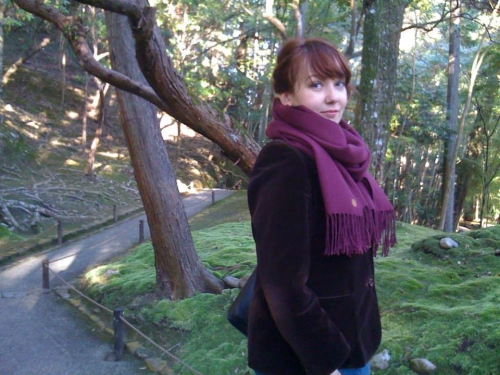No.023 - An interview with research fellows visiting NIHU – Assistant Professor Helena Čapková
An interview with research fellows visiting NIHU – Assistant Professor Helena Čapková
We asked Assistant Professor Helena Čapková, a former International Placement Scheme (IPS) fellow of the UK’s Arts and Humanities Research Council (AHRC), about her research interests and her fellowship experience at the International Research Center for Japanese Studies (Nichibunken) in Kyoto. Helena is currently Assistant Professor at Waseda University in Tokyo, where she teaches art history.
Helena, what are your research interests and what projects you are working on now?
Since obtaining my PhD in 2012, I have been continuously building on the research and network of artists and projects that I uncovered during my postgraduate research in Japan as an IPS fellow and Europe. My research interest is transnational visual culture that lived in Japan and Central Europe in the 1920s and 1930s.
Among a number of ongoing projects, if I had to pick one, I would choose my research on the Japanese Bauhaus connections. This project recently became a part of a large international project called “Bauhaus 100/ Bauhaus Imaginista”. Under this project, the history of modern Japanese design inspired by the Bauhaus will become internationally recognized and I am thrilled about.
Where do you see yourself in the next 5 years? 10 years?
I am hoping to stay in the field of art history and Japanese studies, developing research projects and teaching, which I enjoy very much.
What do you wish you would have known on your first day at Nichibunken?
I should have been much more relaxed and comfortable. Nichibunken is a really exciting and inspirational place for a young researcher. I had a fantastic mentor, Professor Inaga who was incredibly helpful during my fellowship.
What was your most memorable moment during your IPS fellowship in Japan?
There were a few. But one would definitely be the discovery of a correspondence from a Czech architect, Bedrich Feuerstein to a Japanese architect couple, the Tsuchiuras, that I didn’t even imagine would exist in a private archive. I was able to obtain photocopies of the letter, but only because there were colleagues who were supportive and made introductions that would make it happen. I think being introduced to the right people is key to making discoveries, especially in Japan where networks play a significant role.
What is your advice for students or early career researchers considering to do research in a different country or culture?
Referring to my previous point, network! As IPS fellows, young researchers are in the best position to be introduced to a wide network of colleagues that will prove indispensable in their future careers.
Assistant Professor Helena Čapková
Helena Čapková is an Assistant Professor teaching art history at the Waseda University’s School of International Liberal Studies of the in Tokyo. She received her PhD. at the TrAIN (Transnational Art Identity and Nation) Research Centre of the University of the Arts in London. Her research focuses on the exchange within the artists` network that connected Japan and Central Europe in the interwar era. Other areas of interest include: Transnational Visual Art Studies, Japonisme, Modernism, 20th Century Architecture, Design and Photography. She received her undergraduate and postgraduate training in Art History and Japanese Studies in Charles University, Prague and SOAS, London.
Helena’s publications focus on the role of progressive education within modernism which include: Transnational networkers - Iwao and Michiko Yamawaki and the formation of Japanese Modernist Design (2014), Bauhaus and tea ceremony: a study of mutual impact in design education between Germany and Japan in the interwar period (“Eurasian Encounters: Intellectual and Cultural Exchanges, 1900-1950”, 2016). Helena has written a book about Czech purist architect and progressive stage designer Bedřich Feuerstein and Japan (Bedřich Feuerstein - Cesta do nejvýtvarnější země světa, Kant/Aula, Praha, 2014).
In her free time, she enjoys going to see exhibitions and to the theatre with her Japanese friends.

